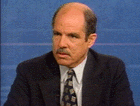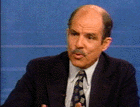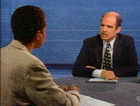PACKAGE DEAL
AUGUST 19, 1997
TRANSCRIPT
I posted this due to all the concerns and comments for pension cuts. This was just one issue - the article was too long for all the issues. May be useful information - may not
AUGUST 19, 1997
TRANSCRIPT
I posted this due to all the concerns and comments for pension cuts. This was just one issue - the article was too long for all the issues. May be useful information - may not
UPS workers will return to work after a painful 15-day strike that affected mail delivery throughout the United States. The Teamsters Union won many of the bargaining points. 10,000 part-time jobs will become full-time positions and the union will maintain control of the pension funds. A background report is followed by interviews with both sides.
The pension plan remains under the control of the Teamsters.
PAUL SOLMAN: And what about this pension issue? Because there was a lot made of that by the company--
GAYE WILLIAMS: Yes.
 PAUL SOLMAN: --in the last week certainly. You've got everything you wanted here?
PAUL SOLMAN: --in the last week certainly. You've got everything you wanted here?
GAYE WILLIAMS: Absolutely.
PAUL SOLMAN: And that is what?
GAYE WILLIAMS: Well, there are going to be substantial pension increases. And those pension increases are going to be done through Teamster and other employer, multi-employer pension plan, not a company-controlled pension plan, as UPS had insisted through the 15 days of the strike. So that's a big victory for our members. They will be able to as their pension investments earn more money over time, they will see those investments come back to them in the form of improved benefits, extra pay, those sorts of things. And their pensions will be controlled jointly by the union and employers, not solely controlled by UPS.
PAUL SOLMAN: What was the final sticking point? I read that at the last minute the people were ready to agree and then no, it didn't work. What was happening there?
 GAYE WILLIAMS: Well, what was going on was there was never--you know, up until very late in the day last night there were not agreements on any of the major issues.
GAYE WILLIAMS: Well, what was going on was there was never--you know, up until very late in the day last night there were not agreements on any of the major issues.
PAUL SOLMAN: Any?
GAYE WILLIAMS: No. So there were sort of reports of, well, we were very close--
PAUL SOLMAN: The president--President Clinton said that.
GAYE WILLIAMS: But there weren't--there was not agreement on any of the major issues. Things fell together, and we now have a contract, and our members are going to be voting on that soon.
 PAUL SOLMAN: Why did it take so long, do you think?
PAUL SOLMAN: Why did it take so long, do you think?
GAYE WILLIAMS: I don't know. UPS lost millions of dollars a day in business. They put their customers and employees to great inconvenience.
PAUL SOLMAN: Most of that money, I take it, is actually money that would have gone to the Teamsters--the workers, the employees because that's got to be most of the expense of the company, right?
GAYE WILLIAMS: I don't know what that money would have gone to.
 PAUL SOLMAN: There are revenues coming in.
PAUL SOLMAN: There are revenues coming in.
GAYE WILLIAMS: They now have a contract. So they will--they are going to be experiencing pay increases, pension contribution increases, improved benefits at UPS. So they did not lose out on this. They stood strong. They gained new job opportunities, pay increases, pension contribution increases that are equal or better than what the company had been promising in a company-controlled pension plan. So, again, I think what's a crime here is that UPS prolonged this strike; that we had to have it drag out for 15 days when the proposal that ultimately was agreed on as a contract, a tentative agreement, was very close to what the union was proposing on August 2nd. So I'm not sure why UPS wanted to prolong the strike, but we're glad it's over and that our members are going back to work.
GAYE WILLIAMS: Yes.

GAYE WILLIAMS: Absolutely.
PAUL SOLMAN: And that is what?
GAYE WILLIAMS: Well, there are going to be substantial pension increases. And those pension increases are going to be done through Teamster and other employer, multi-employer pension plan, not a company-controlled pension plan, as UPS had insisted through the 15 days of the strike. So that's a big victory for our members. They will be able to as their pension investments earn more money over time, they will see those investments come back to them in the form of improved benefits, extra pay, those sorts of things. And their pensions will be controlled jointly by the union and employers, not solely controlled by UPS.
PAUL SOLMAN: What was the final sticking point? I read that at the last minute the people were ready to agree and then no, it didn't work. What was happening there?

PAUL SOLMAN: Any?
GAYE WILLIAMS: No. So there were sort of reports of, well, we were very close--
PAUL SOLMAN: The president--President Clinton said that.
GAYE WILLIAMS: But there weren't--there was not agreement on any of the major issues. Things fell together, and we now have a contract, and our members are going to be voting on that soon.

GAYE WILLIAMS: I don't know. UPS lost millions of dollars a day in business. They put their customers and employees to great inconvenience.
PAUL SOLMAN: Most of that money, I take it, is actually money that would have gone to the Teamsters--the workers, the employees because that's got to be most of the expense of the company, right?
GAYE WILLIAMS: I don't know what that money would have gone to.

GAYE WILLIAMS: They now have a contract. So they will--they are going to be experiencing pay increases, pension contribution increases, improved benefits at UPS. So they did not lose out on this. They stood strong. They gained new job opportunities, pay increases, pension contribution increases that are equal or better than what the company had been promising in a company-controlled pension plan. So, again, I think what's a crime here is that UPS prolonged this strike; that we had to have it drag out for 15 days when the proposal that ultimately was agreed on as a contract, a tentative agreement, was very close to what the union was proposing on August 2nd. So I'm not sure why UPS wanted to prolong the strike, but we're glad it's over and that our members are going back to work.

